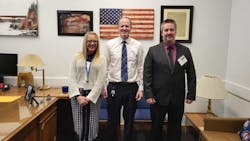Arrowhead Transit advocates for improved transit access and support in rural Minnesota communities
Arrowhead Transit’s Director Brandon Nurmi and Assistant Director of Administration Colette Hanson went to the Minnesota State Capitol on March 13 to advocate for improved transportation access and public transit support in rural Minnesota communities. Arrowhead Transit serves 10 counties across northeastern Minnesota.
The initiative kicked off with a rally hosted by the Transportation Alliance. Minnesota Gov. Tim Walz attended the event and gave opening remarks, emphasizing the critical importance of transportation infrastructure in rural areas. Among the attendees was the Minnesota Public Transit Association, underscoring the collective commitment to addressing transportation challenges statewide.
During the legislative meeting, there was a particular emphasis on securing essential funding for Greater Minnesota, including the absence of a proposed $10 million bonding allocation for rural transit in Gov. Walz’s bonding request. Arrowhead Transit notes Nurmi and Hanson advocated for future funding mechanisms that would continue to ease local match requirements for Greater Minnesota Rural Transit Systems, which is projected to become a barrier to public transit sustainability and expansion.
Another crucial aspect discussed in the legislative meeting was the expansion of current statutes to allow the sharing of existing third-party testers in public transit systems for Commercial Driver’s License (CDL) licensure. The proposed bill aims to reduce barriers to driver hiring as current wait times for CDL testing exceed 60 days in many areas.
Arrowhead Transit notes volunteer driving programs was also a component of the conversation, underlining the significance of community engagement in addressing transportation gaps. Hanson highlighted the impactful role of volunteer drivers in ensuring mobility for individuals who may otherwise be isolated due to limited transit options.
Nurmi and Hanson met with key legislators, including State Rep. Spencer Igo (R-07A), State Sen. Mark Johnson (R-01) and State Sen. Rob Farnsworth (R-07). The meetings provided an invaluable opportunity to directly engage with policymakers, sharing insights and perspectives on the pressing transportation needs of rural constituents.
